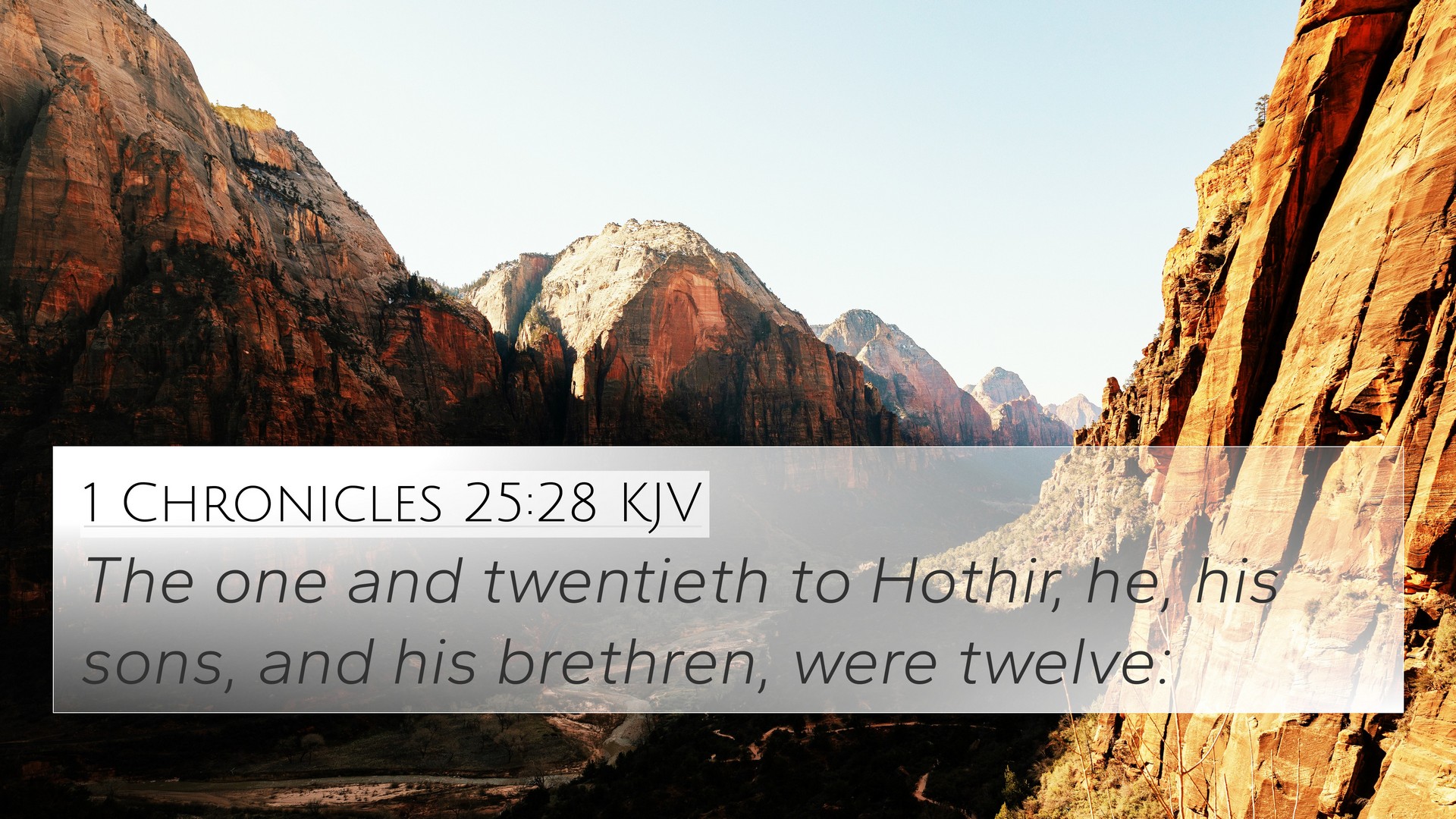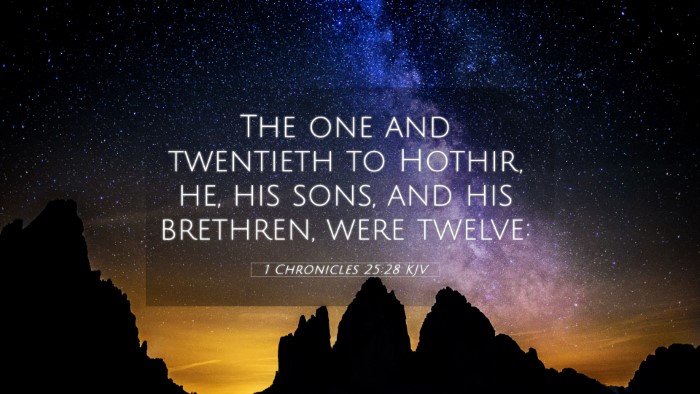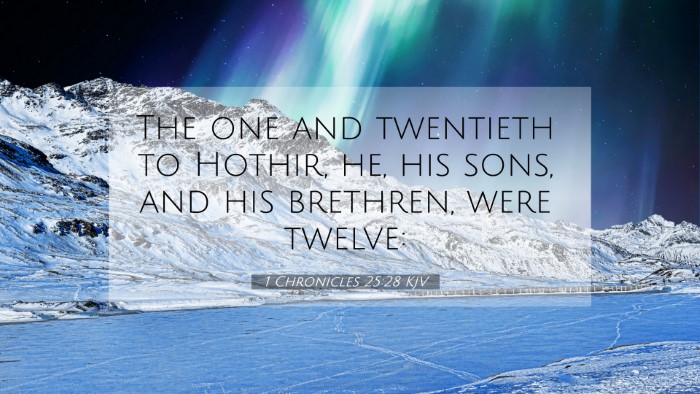Understanding 1 Chronicles 25:28
1 Chronicles 25:28 states, “The son of Jeduthun; his sons and his brethren, capable men, three score and twelve.” This verse is part of a broader narrative concerning the organization of the Levitical choir, specifically those who were overseers in the worship of the Lord through music and praise. Within the context of this chapter, this verse highlights the significance of proper organization and the spiritual qualifications of those involved in leading worship.
Historical Context
This passage falls under the larger theme of David's preparations for temple worship, which underscores the importance of music in the spiritual life of Israel. The mention of “capable men” suggests a careful selection process, emphasizing the need for skilled and dedicated individuals to perform sacred duties.
Commentary Insights
- Matthew Henry: He emphasizes that the appointment of these musicians, particularly under the lineage of Jeduthun, denotes the importance of music in worship and the qualifications of those involved. Henry also notes how this reflects not just physical capability, but spiritual vitality as well, which is essential for leading the congregation in praise.
- Albert Barnes: Barnes highlights the specified number of “three score and twelve,” which demonstrates the organization and systematic approach of David in establishing roles within the temple service, further illustrating the communal aspect of worship that was vital for the Israelites.
- Adam Clarke: Clarke points out the significance of the numbers mentioned in the verse. Each musician symbolizes a connection to the overarching worship framework established by David, suggesting that each individual plays a critical role in the pool of collective worship and represents God's presence among His people.
Biblical Cross-References
To build a comprehensive understanding of 1 Chronicles 25:28, we can explore several Bible verses that relate to the themes of worship, music, and spiritual leadership:
- Psalms 33:3: “Sing unto him a new song; play skillfully with a loud noise.” This verse connects the call for skillful worship with the responsibilities of the musicians described in our primary passage.
- 1 Samuel 16:23: “And it came to pass, when the evil spirit from God was upon Saul, that David took a harp, and played with his hand: so Saul was refreshed, and was well, and the evil spirit departed from him.” Here, we see the power of music in spiritual contexts, resonating with the role of Jeduthun's descendants as musicians.
- 2 Chronicles 5:12-13: This passage describes the priests and Levites, including singers, who exalted the Lord during the temple's dedication, showing the continuity of musical worship in Israel.
- Psalms 150:1-6: An exhortation to praise God with various instruments, this scripture complements the tasks and dedication of the Levitical musicians.
- Exodus 15:20-21: This presents the first recorded instance of praises sung after crossing the Red Sea, illustrating worship's role in Israel's deliverance and joy.
- 1 Chronicles 16:41-42: Here, David appoints certain Levites to minister before the Ark of the Covenant, again highlighting the structured ministry of worship.
- Ephesians 5:19: In the New Testament, Paul encourages believers to “speak to one another in psalms, hymns, and spiritual songs,” linking the old testament traditions with the new covenant community.
Thematic Connections
This verse also allows for thematic connections between various scripture that address the role of worship leaders, the importance of music in spiritual life, and the establishment of order in religious practices:
- Leadership in Worship: The selection of capable men underscores the necessity of leadership that is not only skilled but spiritually attuned, as indicated in passages like 1 Timothy 3:1-7.
- Communal Worship: The collective aspect of worship is evident throughout scripture, including Matthew 18:20, where Jesus states, “For where two or three gather in my name, there am I with them.”
- Importance of Skill in Worship: References like Colossians 3:23 emphasize doing work heartily, which resonates with the talents ascribed to the Levitical singers.
Cross-Referencing Themes and Lessons
To effectively engage with 1 Chronicles 25:28, we can utilize various tools for cross-referencing and explorations into connections between Old and New Testament scriptures:
- Utilizing a Bible concordance allows one to look up key terms related to music and worship.
- Cross-reference Bible study methods can shed light on the parallels observed in worship practices among the Levites and within the Christian church today.
- Bible reference resources can facilitate understanding of how music acts as a unifying force in worship across different eras of biblical history.
Conclusion
Ultimately, 1 Chronicles 25:28 serves as a vital reminder of the role of worship in the life of Israel and the way God established structures for His glory, emphasizing not only the necessity of skilled leadership but also the essential nature of music in approaching God's presence. The links between this verse and others enhance our understanding of worship and its significance throughout the Bible. It encourages deeper reflection on how we engage in spiritual practices today.


